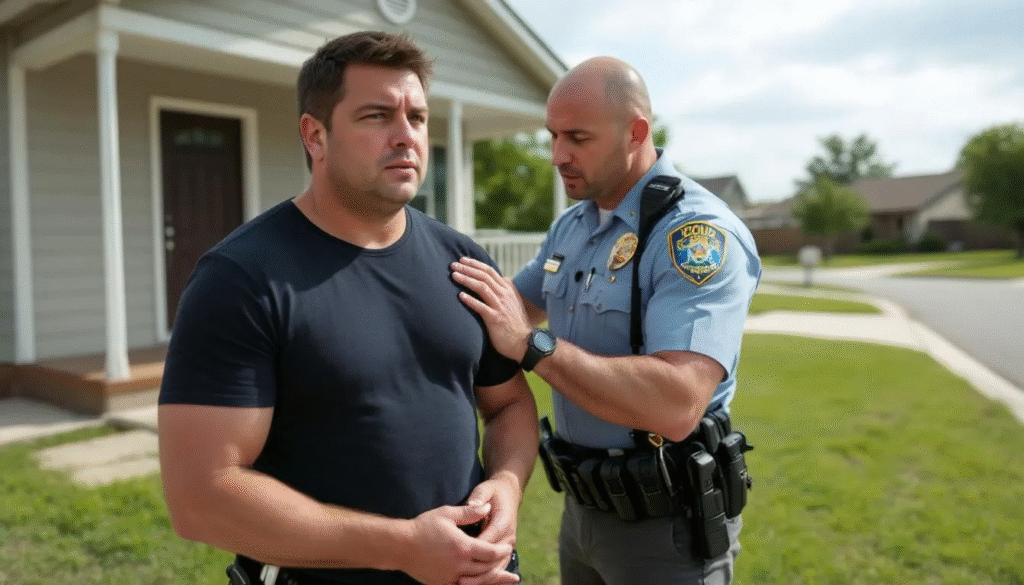
Being accused of domestic violence in Colorado can turn your life upside down in a matter of hours. The state’s comprehensive domestic violence laws create a complex legal landscape where even first-time offenders face severe consequences that extend far beyond criminal penalties. In Colorado, domestic violence is defined as “an act or threatened act of violence” between people in an intimate relationship. Understanding your rights, the legal process, and available defense strategies is crucial for protecting your future.
When you are accused of domestic violence in Colorado, the legal machinery moves quickly- often faster than you can process what’s happening. From mandatory arrests to automatic protection orders, the system is designed to prioritize victim safety while ensuring due process for the accused. This guide provides essential information about navigating domestic violence allegations in Colorado, helping you understand what to expect and how to protect your rights throughout the legal process.
For official information and resources on domestic violence laws and defense in Colorado, you can visit the the Colorado Department of Human Services Domestic Violence Program and the Colorado Bureau of Investigation’s Domestic Violence Resources.

Immediate Steps to Take After Being Accused
The first few hours after domestic violence allegations surface are critical for your case’s outcome. Your actions during this period can significantly impact both the immediate consequences and long-term resolution of your situation.
Do not make any statements to police without an attorney present. Law enforcement officers are trained to gather evidence that supports the alleged victim’s claims. Even seemingly innocent explanations can be twisted to support domestic violence charges. Exercise your right to remain silent and consistently request legal representation from a trusted firm like Criminal Defense Colorado Springs, P.C.
Contact a Colorado domestic violence defense attorney immediately. Time is of the essence in domestic violence cases. Contacting an attorney experienced in getting domestic violence charges dropped in Colorado Springs is your first priority. Attorney Mike Moran can intervene early in the process, potentially influencing charging decisions and protection order terms. Our criminal defense attorneys are available for emergency consultations for domestic violence allegations.
Comply with any protection orders issued, even if you believe they are unfair. Violating a protection order is a separate criminal offense that can result in additional charges and penalties. Even unintentional violations can lead to arrest and complicate your defense strategy. Violating a protection order in a domestic violence case is a class 1 misdemeanor, which can carry penalties including jail time and fines.
Document any evidence that supports your innocence, including witness contact information. Gather phone records, text messages, emails, photos, and any other evidence that contradicts the allegations. Identify witnesses who can testify about your character or the events in question. This evidence becomes more difficult to obtain as time passes.
Avoid contact with the alleged victim, including through third parties or social media. Direct or indirect contact violates most protection orders and can be perceived as intimidation or harassment. This includes asking friends or family members to contact the alleged victim on your behalf or monitoring their social media accounts.
Understand that you may face mandatory arrest if police find probable cause. Colorado law requires law enforcement officers to make an arrest when they have probable cause to believe domestic violence occurred. This happens regardless of whether the alleged victim wants to press charges or the severity of the accusations. Domestic violence charges can be brought against individuals involved in intimate relationships, including same-sex couples.
Understanding Colorado’s Domestic Violence Laws
Colorado’s approach to domestic violence is unique among states because domestic violence penalties function as a sentence enhancement rather than a standalone crime. This distinction has significant implications for how cases are prosecuted and the potential penalties you face. The Colorado legal system shows little sympathy toward those accused of domestic violence, with many individuals facing harsh restrictions even if they are not convicted.
Domestic violence is a sentence enhancement, not a standalone crime in Colorado. The underlying criminal charges might include assault, harassment, criminal mischief, stalking, or other offenses. When these crimes occur between people in intimate relationships, they receive the domestic violence enhancement, which increases penalties and adds specific requirements.
It applies to crimes committed against someone in an intimate relationship. Colorado domestic violence laws define intimate relationships broadly to include current and former spouses, unmarried partners who live or have lived together, individuals who have a child together, and people who are or have been in a dating relationship. However, these laws do not protect relationships that are not intimate, such as those between roommates or co-workers.
Intimate relationships include spouses, ex-spouses, unmarried couples, and co-parents. The law recognizes that domestic abuse often occurs between co-parents even after their romantic relationship has ended. This means that conflicts between ex-partners regarding child custody, visitation, or support can result in domestic violence charges if they involve threatening behavior or physical altercations.
The enhancement can apply to assault, criminal mischief, harassment, stalking, and other offenses. Common underlying charges in domestic violence cases include third-degree assault (causing bodily injury), harassment (following or engaging in course of conduct that alarms the victim), criminal mischief (damaging property), and violation of protection orders.
Colorado Revised Statutes Title 18, Article 6, Part 8 defines domestic violence laws. These statutes establish the legal framework for what constitutes domestic violence, sentencing enhancements, and mandatory treatment requirements. Understanding these laws helps you comprehend the charges you’re facing and potential defenses.
The law covers physical violence, threats, and acts intended to control or intimidate. Recent legislative changes have expanded recognition of domestic abuse to include economic abuse, coercive control, and psychological abuse. Domestic violence charges in Colorado include not only physical violence but also emotional and psychological abuse. This means that controlling someone’s finances, isolating them from friends and family, or engaging in gaslighting can support domestic violence charges even without physical contact.

What Happens After the Accusation
The legal process begins immediately after domestic violence allegations are made, often before you fully understand what’s happening. Understanding this timeline helps you prepare for what’s ahead and make informed decisions about your defense.
Police must arrest if probable cause exists that domestic violence occurred. Colorado’s mandatory arrest law requires officers to make an arrest when they have probable cause to believe domestic violence happened within the past four hours. Officers cannot simply warn the parties or ask one person to leave for the night.
You may be held in jail for 24-48 hours until a bond hearing. Most domestic violence arrests result in an automatic hold period during which you cannot be released on bond. This cooling-off period is designed to protect the alleged victim and allow emotions to settle before determining appropriate bond conditions.
A mandatory protection order will be issued automatically upon arrest. Colorado courts issue automatic temporary protection orders in all domestic violence cases. These orders take effect immediately and remain in place until modified by the court or until the case is resolved. When charged with domestic violence in Colorado, a mandatory protection order is automatically issued, requiring you to avoid contact with the accuser.
The protection order prohibits contact with the alleged victim and may require alcohol abstinence. Standard protection order terms include no contact with the alleged victim in person, by phone, text, email, or social media. Many orders also require complete abstinence from alcohol and controlled substances, regular testing, and surrender of firearms.
You must surrender any firearms to law enforcement or a licensed third party. Federal and state laws prohibit possession of firearms while subject to a domestic violence protection order. You typically have 24 hours from service of the order to surrender all weapons to police or transfer them to a qualifying third party.
An advisement hearing will inform you of formal charges and bond conditions. This initial court appearance usually occurs within 48-72 hours of arrest. The judge will advise you of the charges, appoint counsel if you cannot afford an attorney, and set bond conditions that you must follow while the case is pending.
Protection Order Requirements
Protection orders in domestic violence cases include specific requirements that you must understand and follow precisely. Violating any term of a protection order is a separate criminal offense that can result in additional charges and penalties.
No contact with the alleged victim in person, by phone, text, email, or social media. This means you cannot call, text, email, send letters, or contact the alleged victim through social media platforms. You also cannot ask others to contact them on your behalf or monitor their online activity.
Stay at least 100 yards away from the victim’s home, workplace, and children’s school. The protection order typically establishes specific locations where you cannot go, including the alleged victim’s residence, workplace, children’s schools, and other places they frequent. You’re responsible for maintaining the required distance even if this means changing your routine.
Complete abstinence from alcohol and drugs (if ordered). Many protection orders require total abstinence from alcohol and controlled substances, with regular testing to ensure compliance. This requirement applies even if substance use played no role in the alleged incident.
Surrender firearms within 24 hours of service. You must surrender all firearms, ammunition, and concealed carry permits to law enforcement or transfer them to a qualifying third party within 24 hours of being served with the protection order. Failure to comply is a federal crime.
Protection orders remain in effect until modified by the court or case resolution. These orders don’t automatically expire and continue until the judge modifies them or your case is completely resolved. Even if charges are dismissed, the protection order may remain in place unless specifically lifted by the court.
The Court Process in Colorado
Colorado’s court system handles domestic violence cases through specialized procedures designed to balance victim safety with due process rights. Understanding this process helps you navigate the legal system more effectively and make informed decisions about your defense strategy.
Domestic violence cases are often fast-tracked in specialized courts. Many Colorado jurisdictions have dedicated domestic violence courts with judges who specialize in these cases. These courts move quickly through their dockets and have specific procedures for handling protection orders, treatment requirements, and victim safety concerns.
First appearance typically occurs within 24-48 hours of arrest. Your initial court appearance, called an advisement or first appearance, happens quickly after arrest. During this hearing, the judge will inform you of the charges, appoint an attorney if needed, and set bond conditions.
Arraignment where you enter a plea of guilty, not guilty, or no contest. At the arraignment, you’ll enter your formal plea to the charges. Most experienced attorneys from Criminal Defense Colorado Springs, P.C. recommend entering a not guilty plea initially, preserving your right to negotiate with prosecutors and explore all defense options before making final decisions.
Pre-trial conferences for plea negotiations and case management. The court will schedule several pre-trial conferences where your attorney from Criminal Defense Colorado Springs, P.C. can negotiate with prosecutors, discuss evidence, and potentially reach a plea agreement. These conferences also help manage the case timeline and address any issues with protection orders or bond conditions.
Trial if no plea agreement is reached. If plea negotiations fail, your case will proceed to trial where a judge or jury will determine your guilt or innocence. In domestic violence cases, prosecutors often proceed to trial even when the alleged victim doesn’t want to testify, using other evidence to support their case.
Sentencing if convicted, including mandatory evaluation for treatment programs. A domestic violence conviction requires completion of a court-approved domestic violence treatment program, regardless of the underlying offense or sentence. The court will also impose other penalties based on the specific charges and your criminal history.

Potential Penalties and Consequences
The consequences of a domestic violence conviction extend far beyond standard criminal penalties. Colorado law imposes specific requirements and enhancements that can significantly impact your life for years after the case concludes.
Jail time ranging from 10 days to several years depending on the underlying charge. A domestic violence conviction carries a minimum 10-day jail sentence, even for first-time misdemeanor offenses. Felony domestic violence charges can result in several years in prison, with habitual offender laws potentially imposing much longer sentences.
Fines up to $5,000 for misdemeanors, more for felonies. In addition to jail time, domestic violence convictions include substantial fines. Misdemeanor convictions can result in fines up to $5,000, while felony convictions carry much higher financial penalties that can reach tens of thousands of dollars.
Mandatory completion of domestic violence treatment programs. All domestic violence convictions require completion of a state-approved treatment program, typically lasting 36 weeks for first offenses and longer for repeat convictions. These programs focus on accountability, behavior change, and preventing future violence. For first-time domestic violence offenders, diversion programs may be available to avoid a permanent criminal conviction.
Probation with strict conditions and regular check-ins. Most domestic violence sentences include probation periods with conditions such as no contact with the alleged victim, regular reporting to a probation officer, completion of treatment programs, and compliance with all protection orders.
Community service requirements. Courts often impose community service as part of domestic violence sentences, typically requiring 50-100 hours of service to organizations that work with domestic violence survivors or other community benefit programs.
Permanent criminal record affecting employment and housing opportunities. Most domestic violence convictions cannot be sealed under Colorado law, meaning they appear on background checks permanently. This can impact employment opportunities, housing applications, professional licenses, and other aspects of your life. Additionally, people convicted of domestic violence can face difficulties obtaining housing due to the stigma associated with a domestic violence record.
Enhanced Penalties for Repeat Offenses
Colorado law imposes increasingly severe penalties for subsequent domestic violence convictions, with the ultimate consequence being designation as a habitual domestic violence offender.
Four domestic violence convictions result in habitual offender status. Under Colorado law, a fourth domestic violence conviction within any timeframe results in automatic classification as a habitual domestic violence offender, regardless of how much time has passed between offenses.
Habitual domestic violence offender is a Class 5 felony. This designation is a separate felony charge that carries 1-3 years in prison, in addition to penalties for the underlying offense. The court has no discretion to reduce this sentence or grant probation for the habitual offender enhancement.
Enhanced penalties are in addition to the underlying crime sentence. The habitual offender penalty is served consecutively to the sentence for the underlying domestic violence offense, meaning total prison time can be substantially longer than penalties for the primary charge alone.
Subsequent offenses face increasingly severe consequences. Even before reaching habitual offender status, second and third domestic violence convictions carry enhanced penalties including longer jail sentences, extended treatment programs, and more restrictive probation conditions.
Impact on Your Rights
A domestic violence conviction affects numerous civil rights and privileges beyond criminal penalties. Understanding these collateral consequences helps you make informed decisions about plea negotiations and defense strategies.
Loss of firearm rights during protection order and potentially permanently after conviction. Federal law prohibits firearm possession while subject to a domestic violence protection order. A domestic violence conviction results in permanent federal firearm prohibition, regardless of whether the underlying offense was a misdemeanor or felony. A domestic violence conviction typically leads to a lifetime federal ban on possessing firearms under the Brady Act, regardless of whether the conviction is for a misdemeanor or felony.
Immigration consequences including deportation for non-citizens. Domestic violence convictions are considered crimes of moral turpitude under federal immigration law, potentially resulting in deportation, inadmissibility for future immigration benefits, and denial of naturalization applications. Even legal permanent residents face significant immigration risks from domestic violence convictions.
Loss of child custody or visitation rights. Family courts consider domestic violence convictions when making custody and visitation decisions. A conviction can result in supervised visitation requirements, restricted parenting time, or complete loss of custody rights, particularly if the violence occurred in the presence of children.
Professional license suspensions in certain fields. Many professions require disclosure of criminal convictions and may suspend or revoke licenses for domestic violence offenses. This particularly affects healthcare workers, teachers, attorneys, financial professionals, and others in positions of trust.
Difficulty obtaining employment, housing, or professional licenses. Background checks for employment, housing, and professional licensing will reveal domestic violence convictions permanently. Many employers and landlords have policies against hiring or renting to individuals with domestic violence histories.
Federal prohibition on firearm possession for domestic violence convictions. The federal Lautenberg Amendment prohibits firearm possession for anyone convicted of a misdemeanor crime of domestic violence, making this one of the few misdemeanor offenses that results in permanent federal firearm prohibition.
Defense Strategies Available
Effective defense strategies in domestic violence cases require careful analysis of the evidence, charges, and specific circumstances of your case. An experienced attorney from Criminal Defense Colorado Springs, P.C. can identify weaknesses in the prosecution’s case and develop a comprehensive defense strategy.
Challenge the underlying criminal charge to remove the domestic violence enhancement. If the prosecution cannot prove the underlying criminal offense beyond a reasonable doubt, the domestic violence enhancement fails as well. This strategy focuses on disproving elements of the primary charge rather than the relationship aspect. You can petition a judge to dismiss your domestic violence case if rights violations occurred during police procedures.
Argue self-defense if you were protecting yourself from harm. Colorado law allows individuals to use reasonable force to defend themselves from unlawful physical force. If you were defending yourself or others from attack, this can be a complete defense to domestic violence charges.
Dispute the existence of an intimate relationship between parties. The prosecution must prove that you and the alleged victim were in an intimate relationship as defined by Colorado law. If the relationship doesn’t meet statutory requirements, the domestic violence enhancement cannot apply. Your attorney can argue that there was no intimate relationship to challenge the application of the domestic violence enhancement.
Present evidence of false accusations or ulterior motives. In some cases, alleged victims make false accusations to gain advantage in divorce proceedings, child custody disputes, or other civil matters. Evidence of motive to fabricate charges can undermine the prosecution’s case.
Challenge evidence collection or police procedures for constitutional violations. If law enforcement violated your constitutional rights during investigation or arrest, evidence obtained through these violations may be suppressed. This can significantly weaken the prosecution’s case or lead to dismissal of charges.
Negotiate plea agreements to lesser charges without domestic violence enhancement. Experienced attorneys from Criminal Defense Colorado Springs, P.C. can often negotiate with prosecutors to reduce charges to offenses that don’t carry the domestic violence enhancement, avoiding many of the long-term consequences associated with domestic violence convictions.

Working with a Defense Attorney
The complexity of domestic violence cases in Colorado makes experienced legal representation essential for protecting your rights and achieving the best possible outcome. Choosing the right attorney can significantly impact your case’s trajectory and final resolution.
Choose an attorney experienced specifically in Colorado domestic violence cases. Domestic violence law is highly specialized, with unique procedures, penalties, and defense strategies. Look for attorneys who regularly handle these cases and understand Colorado’s specific statutes and court procedures. Criminal Defense Colorado Springs, P.C. has a deep understanding of domestic violence law and the Colorado courts.
Look for lawyers familiar with local prosecutors and court procedures. Each jurisdiction in Colorado has different prosecutors, judges, and procedures for handling domestic violence cases. An attorney with local experience knows how these courts operate and can develop strategies tailored to your specific jurisdiction.
Ensure your attorney can handle protection order modifications and violations. Domestic violence cases often involve ongoing protection order issues that require immediate attention. Your attorney should be able to handle emergency motions, violation allegations, and modifications to protection order terms.
Seek representation that understands immigration and collateral consequences. If you’re not a U.S. citizen, immigration consequences of domestic violence convictions can be more severe than criminal penalties. Choose an attorney who understands these issues and can craft defense strategies that minimize immigration risks.
Consider attorneys who have prosecutorial experience in domestic violence cases. Former prosecutors understand how the other side builds cases and can anticipate prosecution strategies. This insight can be valuable in developing effective defense strategies and negotiating favorable plea agreements.
Schedule consultations quickly as early intervention improves outcomes. The sooner an attorney from Criminal Defense Colorado Springs, P.C. gets involved in your case, the more options you may have for defense strategies and case resolution. Many attorneys offer free consultations for domestic violence cases and can begin working immediately.
Long-Term Record Implications
Understanding the long-term implications of domestic violence records is crucial for making informed decisions about plea negotiations and defense strategies. Colorado’s record sealing laws provide limited options for domestic violence convictions. Domestic violence convictions in Colorado are not sealable from your criminal record unless it is a municipal court case.
Most domestic violence convictions cannot be sealed under Colorado law. Unlike many other criminal offenses, domestic violence convictions generally remain on your criminal record permanently. This has significant implications for employment, housing, and other background check situations.
Municipal court convictions may be eligible for sealing after three years. Some municipal ordinance violations that result in domestic violence convictions may be eligible for record sealing after a three-year waiting period, provided you meet all requirements and have no subsequent convictions. Municipal court DV-related convictions can typically be sealed three years after the case ends.
Dismissed charges can be sealed immediately in most cases. If your domestic violence charges are dismissed or you’re found not guilty, you can typically petition to seal the arrest record immediately. This prevents the charges from appearing on background checks. Any DV-related charge that gets dismissed is sealable immediately, regardless of the court.
Convictions appear on background checks permanently. Most domestic violence convictions remain visible on criminal background checks for life, affecting employment opportunities, housing applications, professional licensing, and other situations requiring background screening.
Record sealing requires court petition and $65 filing fee. Even when eligible for record sealing, you must petition the court and pay required fees. The process requires specific forms and procedures that vary by jurisdiction. To seal a domestic violence conviction in Colorado, individuals must follow a specific court process and may need to submit a petition. Those with a sealed domestic violence record must provide copies of the sealing order to relevant agencies such as the police department.
Criminal history affects future domestic violence charges with enhanced penalties. Previous domestic violence convictions remain relevant for sentencing purposes even if you’re eligible for other forms of record relief. Prior convictions can result in enhanced penalties for any future charges. In Colorado, sealing of records is subject to different rules based on whether the conviction was in a municipal court or a non-municipal court.
If the Alleged Victim Recants
Many people believe that domestic violence cases automatically end if the alleged victim recants their accusations or refuses to cooperate with prosecution. However, Colorado’s approach to these cases is more complex than this common misconception suggests.
Prosecutors may continue the case even if the victim recants the accusation. Colorado follows a “no-drop” prosecution policy in many jurisdictions, meaning prosecutors can pursue domestic violence cases even without victim cooperation. The state has an independent interest in prosecuting domestic violence regardless of the alleged victim’s wishes.
Police and prosecutors are trained to be skeptical of recantations. Law enforcement and prosecutors understand that domestic violence victims often recant due to pressure, fear, financial dependence, or other factors related to the abusive relationship. They’re trained to look beyond recantations when evaluating cases.
Cases may proceed based on independent evidence like photos, recordings, or witness testimony. Prosecutors can build cases using evidence beyond victim testimony, including photographs of injuries, audio or video recordings, witness statements, police observations, medical records, and physical evidence from the scene.
Colorado follows a “no-drop” prosecution policy in many jurisdictions. This policy reflects the understanding that domestic violence affects public safety beyond just the immediate victim. Many prosecutor’s offices pursue these cases even when victims are uncooperative or ask for charges to be dropped.
Victim cooperation is helpful but not always necessary for conviction. While victim testimony can strengthen the prosecution’s case, Colorado law allows prosecutors to proceed with other evidence. Some jurisdictions have specialized units focused on prosecuting domestic violence cases without victim cooperation.
Recantation alone rarely results in case dismissal without corroborating evidence. If the alleged victim recants but other evidence supports the charges, prosecutors typically continue with the case. However, recantation combined with lack of other evidence or credible alternative explanations for the evidence may lead to dismissal or more favorable plea negotiations.

When you are accused of domestic violence in Colorado, understanding the complexity of the legal system and your rights is essential for protecting your future. The state’s comprehensive domestic violence laws create serious consequences that extend far beyond criminal penalties, affecting your ability to possess firearms, maintain employment, secure housing, and maintain relationships with your children.
The key to navigating these challenges successfully lies in immediate action and experienced legal representation. From the moment allegations arise, every decision you make can impact the outcome of your case. Working with a Colorado criminal defense attorney who specializes in domestic violence cases, such as those at Criminal Defense Colorado Springs, P.C., gives you the best opportunity to protect your rights and achieve a favorable resolution.
If you’re facing domestic violence allegations in Colorado, don’t wait to seek help. Contact Criminal Defense Colorado Springs, P.C. immediately to discuss your case and begin building your defense strategy. Early intervention can make the difference between a conviction that follows you for life and a resolution that allows you to move forward with your future.
